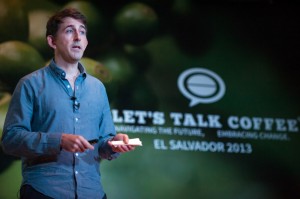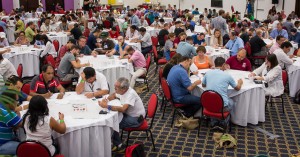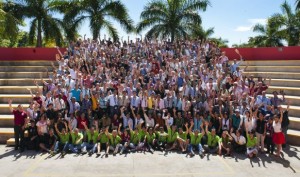On October 9-12, Sustainable Harvest®’s 12th-annual Let’s Talk Coffee®conference outside Panama City will bring together more than 500 stakeholders throughout the specialty-coffee supply chain, including roasters, producers, and financiers. Leading up to the event, we’re profiling some of the people and elements that make Let’s Talk Coffee® an unforgettable, one-of-a-kind event.
 When Oliver Strand journeyed to El Salvador to give the keynote at Let’s Talk Coffee® 2013, he knew he’d face a far different audience from the consumers he reaches as a journalist with the New York Times, Bon Appetit, and Vogue. “It was very satisfying to speak to a room of mostly coffee growers,” he says. “It’s a part of the coffee industry that I don’t get to talk to that much.” Oliver has continued to immerse himself in the coffee industry, and he’s putting the finishing touches on a book about the subject that is due for release next year.
When Oliver Strand journeyed to El Salvador to give the keynote at Let’s Talk Coffee® 2013, he knew he’d face a far different audience from the consumers he reaches as a journalist with the New York Times, Bon Appetit, and Vogue. “It was very satisfying to speak to a room of mostly coffee growers,” he says. “It’s a part of the coffee industry that I don’t get to talk to that much.” Oliver has continued to immerse himself in the coffee industry, and he’s putting the finishing touches on a book about the subject that is due for release next year.
While he delivered a speech titled “Killing the Conversation” at the 2013 conference, this year he’ll be leading a panel about world-class retail concepts that will include well-known roasters and cafe owners known for pushing forward on quality. (Panelists will be announced soon.) We talked to Oliver about his 2013 experience, why the coffee industry fascinates him, and what he wants to explore in this year’s Let’s Talk Coffee® panel.
Q: Coffee growers accounted for roughly half the audience when you spoke at last year’s Let’s Talk Coffee®; what was your experience speaking to them?
A: Different. The audience I speak to through my writing is mostly consumers. And most consumers don’t think too deeply about why they buy a certain coffee—they often want to drink a coffee they like drinking.
At Let’s Talk Coffee®, the audience I spoke to last year is directly affected by the decisions those consumers make. That made me stop and think about those decisions, which are done largely instinctively. There’s that old adage, “I’m not an expert, but I know what I like.” Fair enough. But when you talk to the makers of a product, you’re coming at that statement from the other side, and it forces you to explore what’s behind people’s instincts that causes them to like something.
Bringing together the mindset of the consumer with that of the producer and making that connection in my brain was enlightening to me.
 Q: What is it like to be writing a book about coffee in 2014?
Q: What is it like to be writing a book about coffee in 2014?
A: It’s very interesting, largely because to me this moment in coffee defies most logic of the marketplace. In New York City, where I’m based, there’s very little reason for specialty coffee to exist when you consider the exorbitant rents, the overwhelming marketing of large chains, the ease of convenience. Specialty coffee is battling all that. It’s expensive, though not as expensive as it could be. There’s zero advertising, almost no marketplace savvy. And, for the most part, you have to seek it out, and stand in a slower line when you get there.
Keep in mind that New York has always been a luxury market, a place where niche products flourish, but even so there are just so many of these shops here. It tells me that there’s something about quality coffee that draws an audience. It’s not just in New York of course—this is happening around the country in smaller cities. Some are destination shops in the same way you have pilgrimage restaurants, but most are just good places to get coffee and that are a part of the fabric of daily life in their communities. This is happening at a grassroots level. There’s no company bankrolling it, or national coffee board promoting it. So the reinvention and rediscovery of coffee is happening organically and intuitively, and I think that’s amazing.
Q: Will you focus on this with the panel?
 A: Yes, I want to talk to the panel about their impression of what’s happening in this story. What’s going on? Who’s buying specialty coffee? How are they responding to the specific needs of their customers? I also want to talk to them about what they think will happen next. These shops are gathering data whether they realize it or not, and I see this panel as a chance to peek into the next three months, nine months, or two years of what will be happening in coffee. The rainmakers in finance and banking who normally analyze industries like this one didn’t see this specialty-coffee movement coming, and even though there’s been some action from those investment sectors recently, they seem to be reacting to what’s happening on the ground. That makes the store owners and managers of these specialty shops the experts. They’re actually responding to consumers—and responding very successfully. Hearing from them will be invaluable.
A: Yes, I want to talk to the panel about their impression of what’s happening in this story. What’s going on? Who’s buying specialty coffee? How are they responding to the specific needs of their customers? I also want to talk to them about what they think will happen next. These shops are gathering data whether they realize it or not, and I see this panel as a chance to peek into the next three months, nine months, or two years of what will be happening in coffee. The rainmakers in finance and banking who normally analyze industries like this one didn’t see this specialty-coffee movement coming, and even though there’s been some action from those investment sectors recently, they seem to be reacting to what’s happening on the ground. That makes the store owners and managers of these specialty shops the experts. They’re actually responding to consumers—and responding very successfully. Hearing from them will be invaluable.




.png)
